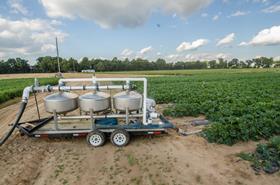
Growers using trickle irrigation systems in England and Wales are having limits set on their water usage for the first time in a move the NFU fears may limit future business growth.
According to Defra, the fact that around 5,000 trickle irrigaton operations are exempt from current licensing rules is creating an unlevel playing field with the 20,000 other licensed water abstractors, whose usage is limited to conserve water in times of low rainfall.
Trickle irrigation systems are preferred to sprayers by many fresh produce growers because they feed water directly to the roots of plants. This minimises water evaporation, saving water and nutrients, however unlicensed growers using the system must be regulated, Defra has decided, to protect rivers during low flows and to reduce unsustainable abstraction.
As of 1 January 2018 unlicensed abstractors will have two years to submit a licence application, and the determination process must be completed within five years of the application window opening.
Applicants will need to demonstrate that their water requirements are consistent with peak abstractions during the past seven years.
The NFU’s water resources specialist Paul Hammett said he was “reassured” that the Environment Agency would “apply a flexible, risk-based approach regarding evidence of historic use by abstractors”. But he raised concerns that the licensing process could harm growers that currently have an exemption, particularly in the protected and nursery stock sectors.
“New licences could limit potential business growth if they are based on past water use rather than future potential need,” Hammett said.
Outlining the need for the new licensing process in its response to a consultation on water licensing, Defra said: “As a result of competing demands for access to water for abstraction, areas of England and Wales are already experiencing water stress.
“Increasing demand for water from those outside of the current licensing system is exacerbating this position.
“We believe that all significant abstractors should be subject to regulation to help protect the water environment and make people’s rights to take water fairer.
“However, we recognise that exempt abstractors have operated lawfully and rely upon their access to water. Our intention is to balance the needs of all abstractors and the environment.”
The NFU acknowledged that environmentally unsustainable trickle operations should be offered an abstraction licence, but said it would “closely monitor” the Environment Agency’s licensing determination process.
In some cases refused applicants may be granted compensation, according to the union, but not if the abstraction is causing “serious damage”.



